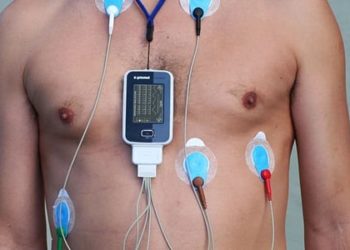Drinking more than 3 cups of coffee a day is associated with increased risk for exfoliation glaucoma or exfoliation glaucoma suspect
Image: PD/NIH
Key study points:
- Consumption of 3 or more cups of caffeinated coffee per day was associated with a 1.66-fold higher risk of developing exfoliation glaucoma/exfoliation glaucoma suspect (EG/EGS) compared to those who did not consume any caffeinated coffee per day (p = 0.02).
- There was no significant association between total caffeine intake (inclusive of coffee and caffeinated soda) and risk of EG/EGS (p = 0.06)
Primer: Glaucoma is a disease that causes damage to the optic nerve leading to visual field loss and blindness. Most glaucoma is caused by either increased production or decreased clearance of aqueous humor in the anterior chamber of the eye causing an increase in intraocular pressure (IOP). Exfoliation Syndrome (ES) is an age-related disease that is characterized by the production and deposition of abnormal extracellular tissue in many ocular tissues. One consequence of ES is exfoliation glaucoma (EG). This occurs when the abnormal tissue accumulates within the trabecular meshwork of the eye, which causes a decrease in the clearance of aqueous humor.
The investigators of this study noted the disproportionate burden of exfoliation glaucoma/exfoliation glaucoma suspect (EG/EGS) in Scandinavian countries despite these countries having the same prevalence of known associated LOXL1 gene variants as other countries — suggesting environmental modifiers may be at play. That Scandinavian countries also happen to be the largest consumers of coffee raised the possibility of coffee consumption being a modifiable environmental risk factor.
Therefore, this widely media-reported study sought to examine the relationship between coffee consumption and the incidence of EG/EGS in US adults.
Background reading:
This [prospective cohort] study: Dietary data were collected every four years for up to 28 years from 78,977 women from the Nurses’ Health Study (NHS) and 41,202 men from the Health Professional Follow-up Study (HPFS). Each participant received biennial questionnaires that addressed their dietary habits (which included 61 food and beverage items), lifestyle tendencies and health status. Patients who reported that they had developed glaucoma were only included in the EG/EGS group if a history of ES was documented in their medical records and if they had met specific criteria for glaucoma. Only 300 women and 60 men met the criteria for the incidence of EG/EGS.
The main finding from the pooled multivariable analyses was that people who drank more than 3 cups of caffeinated coffee per day had a 1.66 increase risk of developing EG/EGS (95% CI, 1.09-2.54) compared to people who did not drink any caffeinated coffee. This effect was modified when participants were stratified by family history. Women who drank more than 3 cups of coffee per day and had a positive family history had a 2.93-higher fold risk (95% CI, 1.16-7.46) whereas women who drank the same amount but had no family history did not have a significant association. Interestingly, risk of EG/EGS was not significantly associated with total caffeine intake (p = 0.06). All analyses accounted for other glaucoma risk factors like smoking, alcohol and cardiovascular co-morbidities.
In sum: This large cohort study concluded that consumption of more than 3 cups of caffeinated coffee per day was associated with a heightened risk of developing EG/EGS compared to non-consumption. Furthermore, a family history of glaucoma appeared to amplify this association.
One biologically plausible pathway linking coffee to exfoliation glaucoma involves homocysteine. Coffee is known to increase plasma levels of homocysteine, which has been associated with increased exfoliation material possibly by damaging microvasculature, changing the extracellular matrix or creating reactive oxygen species. The intriguing lack of an association between overall caffeine consumption and EG/EGS suggests a non-caffeine component of coffee might be culpable, begging further mechanistic studies.
There were several limitations to this study. First, EG/EGS is relatively poorly understood. This makes it hard to identify relevant variables from large studies such as these — it is a distinct possibility that relevant variables may have been excluded from the analyses, or not measured at all. Another limitation is generalizability to more diverse populations, as more than 90% of the study population was of Caucasian descent. Relative strengths of the study are its large sample size and its repeated assessment of dietary behavior. Further research in this field should assess how family history is interacting with caffeine consumption to possibly increase the risk of exfoliation glaucoma.
Click to read the study in Investigative Ophthalmology & Visual Sciences
Click to read an accompanying editorial in MedlinePlus
Written by [JC] and [MP]
© 2012 2minutemedicine.com. All rights reserved. No works may be reproduced without written consent from 2minutemedicine.com. DISCLAIMER: Posts are not medical advice and are not intended as such. Please see a healthcare professional if you seek medical advice.




